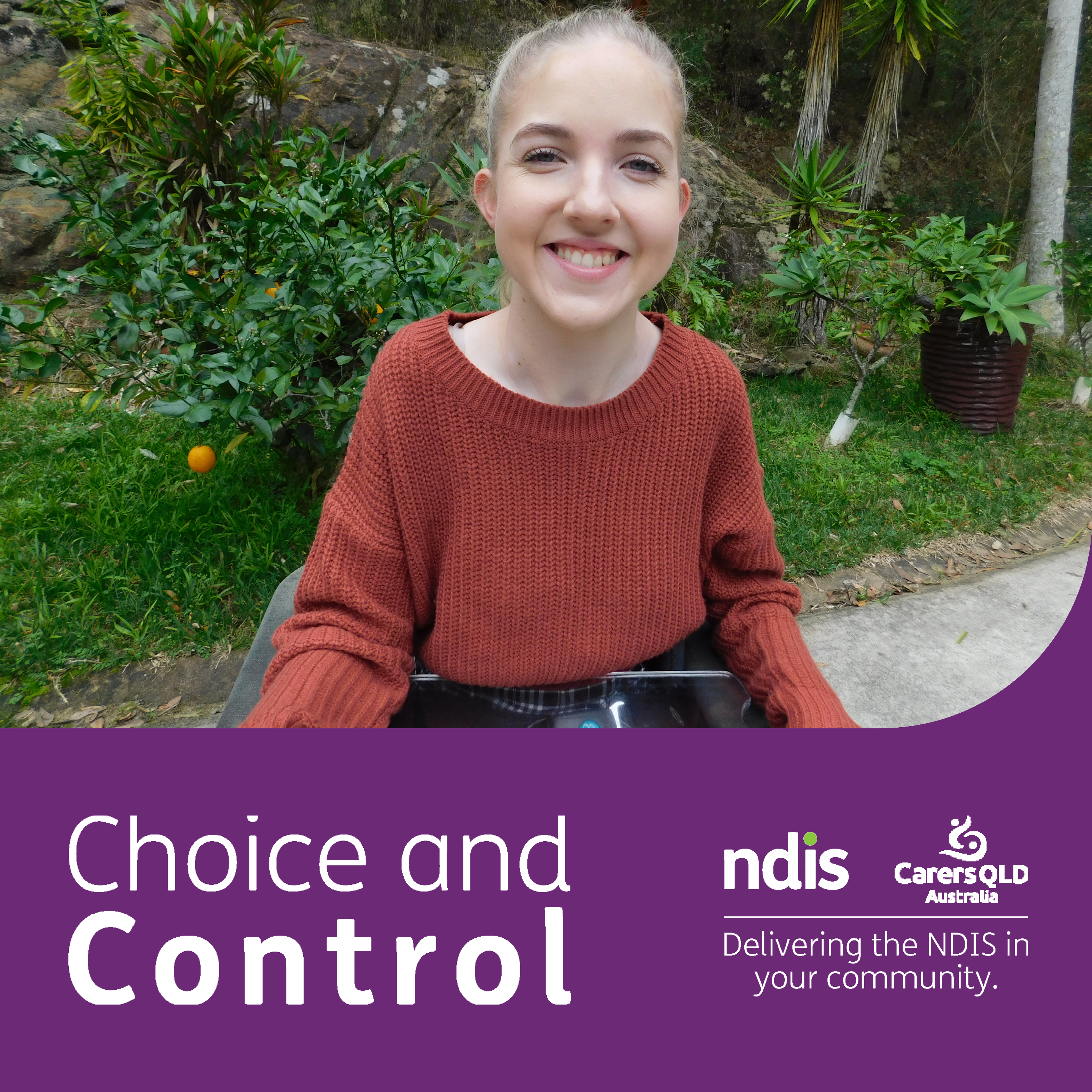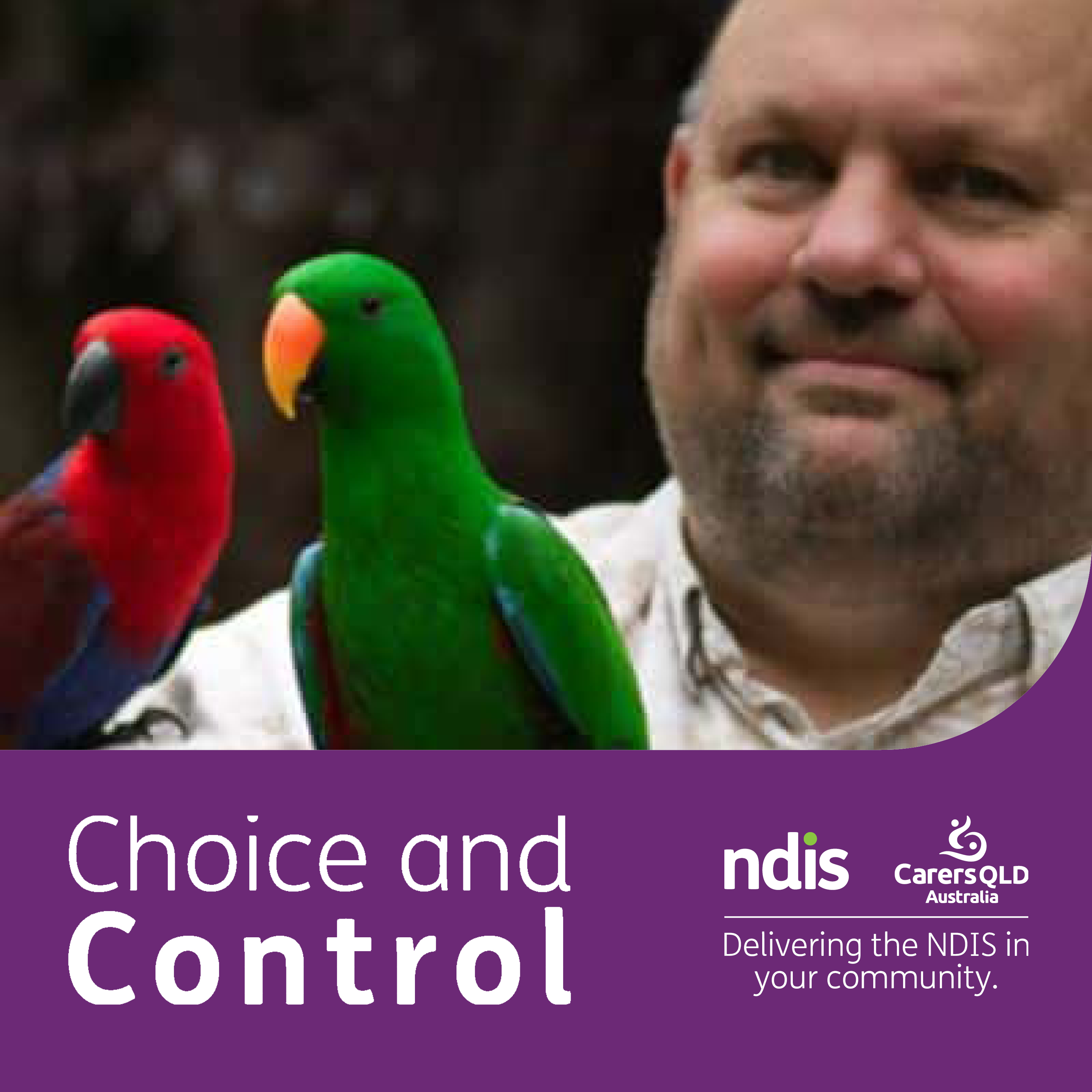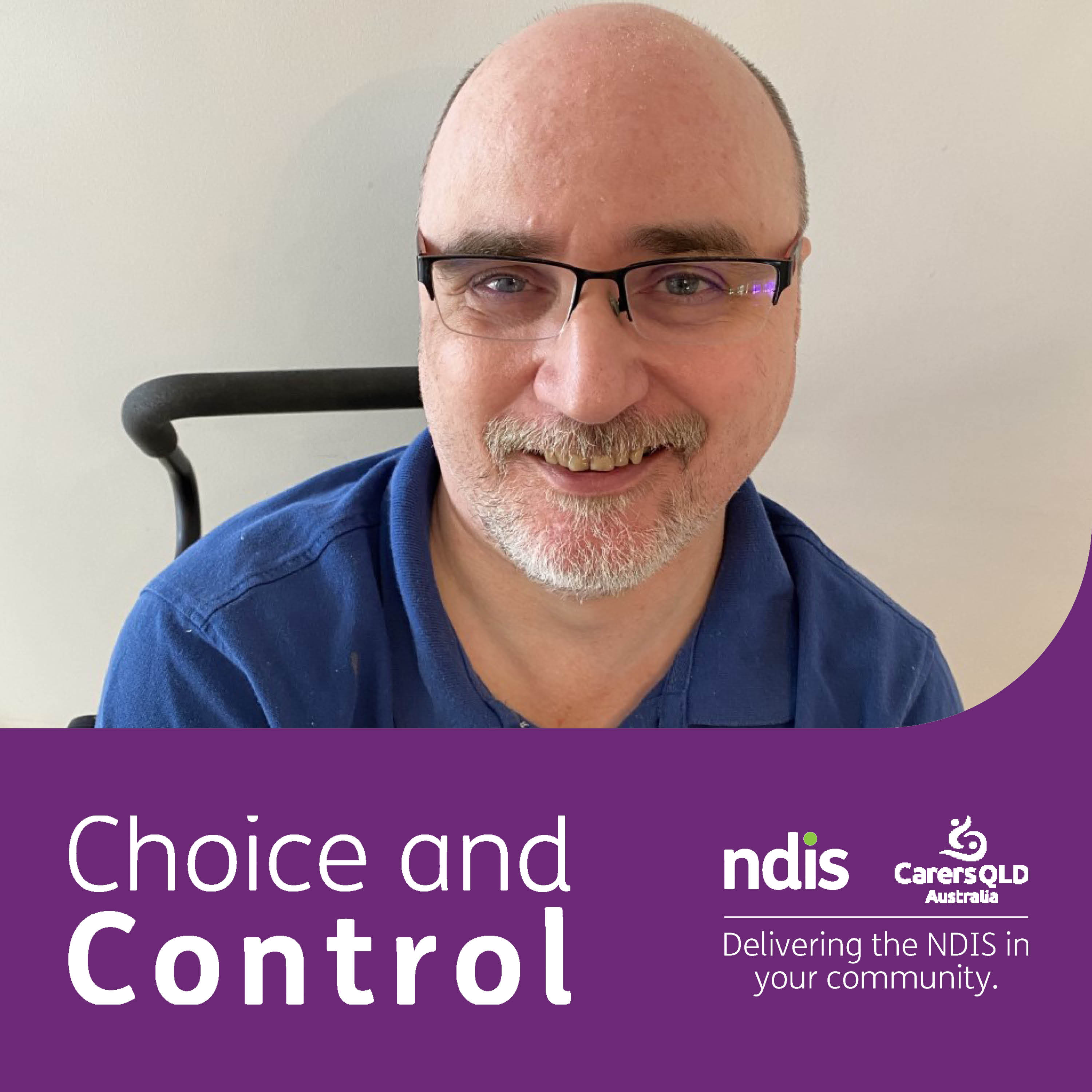[00:00:03] Speaker A: Choice and Control is a podcast celebrating meaningful inclusion of people with disability in our communities, brought to you by Carers Queensland, your NDIS local area coordination partner in the community.
Each episode provides a conversation space for people with disability, their families and carers to share their stories with you. We also hear from members of the wider community, local businesses and community leaders who share information, ideas and possibilities to give you more opportunity and more choice and control in your life.
Carers Queensland is working with emergency service agencies to improve disaster response for people with disability.
Our get ready plan ahead workshops. We aim to reduce disaster risk by including people with disability in disaster planning processes. By working closely with key groups, we're building stronger connections for people with disability to support themselves in an emergency.
In this episode, we hear from a workshop participant who shares what they learned and how they developed their own person centred emergency plan. And I also interview a peer mentor in disaster preparation who shares his lived experience, including the steps taken to better prepare for emergencies in their home environment.
Our first guest is Melissa from Shayla Park. I started by asking Melissa about how she first heard about the cares Queensland emergency preparedness workshop and why she decided to attend.
[00:01:40] Speaker B: I believe that I got an email, perhaps because I received the emails from Carers Queensland.
[00:01:50] Speaker C: And why did you decide to attend the workshop?
[00:01:53] Speaker B: So I decided to attend it because I live independently and I don't actually have a plan in place. Plus I've got support workers and so, like, I've got multiple support workers. So we all kind of needed to sort of have an emergency plan and know what needed to happen and when and how and all that kind of thing because, you know, there's been lots of floods in the general area.
[00:02:27] Speaker C: You live in a flood prone area, do you?
[00:02:30] Speaker B: The exact area that I live in, like, I haven't actually personally been flooded in, but I do live off a road that does get sort of flooded in.
So it has been a little bit hairy at times because I live in quite a hilly area.
[00:02:47] Speaker C: When you went to the workshop, what did you learn about preparing for an emergency in your situation?
[00:02:55] Speaker B: So I didn't know that there was all the help that was actually available and I didn't actually know sort of which sort of organization I would need to call before I got there and what help was available? Yeah, there was lots of things that we learned that day. We got an emergency prepared sort of booklet and a couple of little gadgets to sort of help us out in an emergency as well.
[00:03:29] Speaker C: For people with disability, there are important considerations such as communication styles, assistive technology, medication needs, etcetera. What should people with disabilities be particularly mindful of when it comes to planning for emergencies?
[00:03:46] Speaker B: So definitely those things, I think, like, the medication is a huge one.
Your medications need to be in a specific spot.
It's easy to get to.
Your equipment should also be in a place like your mobility equipment or whatever other equipment someone might need, needs to be in a specific place.
And if you've got support workers, they all need to be on board with where that stuff is and keep it all up to date and in good working order, I guess.
[00:04:21] Speaker C: What steps did you take to increase your preparedness at home after the workshop?
[00:04:27] Speaker B: So I had a meeting with all of my support workers to discuss the emergency workshop and what we learned and to discuss sort of what would need to happen. We needed to discuss things about my animals because I've got a bunch of animals. Yeah. Discuss where all my medical and emergency stuff is, you know, birth certificate, all that really, really important stuff. We haven't done too much other than that, but we're definitely going to be working more on that in the, in the future to try to, you know, make sure everything is completely sorted and everyone knows where they need to go and all that kind of thing.
[00:05:15] Speaker C: Was there anything specific to flooding and floods that you needed to prepare for?
[00:05:22] Speaker B: So with the flooding, although I live in a house, it sort of probably wouldn't get flooded because I live at, like, the bottom, a hill that goes, like further down and beyond, so there's no real place for it to really settle. All the roads around my house can flood.
So, yeah, we've discussed sort of which entryway they would come and we discussed about leaving earlier and that kind of thing, where I might need to go and where I would have my animals stay because I have quite a few.
[00:06:03] Speaker C: So what is the plan as such, Melissa?
[00:06:08] Speaker B: So I will be planning to call, like, one of my closest support workers that live very close to me, and we would be planning to leave earlier, although we would be making sure also that my animals are where they need to be.
We've discussed who they would go to or where they would go.
And, yeah, we've also discussed their medical needs, if, you know, they should require vet care as well.
[00:06:43] Speaker C: Are you feeling more confident in your preparedness now that you've been to the workshop?
[00:06:49] Speaker B: Oh, definitely, yes. There was a lot of things that I learned that day that I had no idea that I would even need to think about.
So I've got my book here handy to read and get more ideas and sort of, you know, get more prepared for the future.
[00:07:10] Speaker C: What were some of those things that you hadn't thought about that you now do?
[00:07:16] Speaker B: Good question.
Yeah, like, obviously I thought about the animals and I thought about my own health and safety and all that kind of stuff, but no, there was so much. There was a lot of organizations that I've not heard of.
There was a lot of things within the booklet itself that a lot of prompts that the booklet has, and I didn't even know that half of that we needed to really think about in.
[00:07:46] Speaker C: Terms of the community, are there community supports you and your family have connected with or can connect with in the future if you need to?
[00:07:56] Speaker B: I haven't personally done that as such.
Most of my supports come from my support workers.
I live alone, my family live a little bit further out. I definitely know of sort of local businesses that do disability work and can offer some kind of assistance.
Oh, that was a major thing. I also learned about, too, the disaster dashboard.
[00:08:29] Speaker C: Tell me about that.
[00:08:31] Speaker B: So there's a whole lot of information on the disaster dashboard about emergencies, what to do in emergencies, how to prepare for them, what you need, what you should do, all that kind of thing, and it has all the numbers and things that you also require.
[00:08:52] Speaker C: We spoke about flood before. What about some of the other risks, like fire, for example?
[00:09:00] Speaker B: I haven't really spoken about the fire stuff, but I do know that that's also important.
There are a lot of different exits of my house that I can use and I have actually sort of come to the sort of conclusions about how I would get out of here.
And we have actually discussed sort of the whole animal sort of situation, what they would need to do as well.
[00:09:34] Speaker C: What's the main advice that you'd have for people with disability and their support team around getting ready for emergencies?
[00:09:43] Speaker B: So I would go to the disaster dashboard that has everything on there that you need. It has all the information you require, all the things you might not think about.
I would definitely suggest actually making plans to do evacuations or even do a mock evacuation, discuss where you're going to go, discuss where your animals are going to go, all that kind of thing.
It's a really good idea, especially with your medical equipment or disability equipment as well.
[00:10:19] Speaker C: Have you organised everything now, Melissa? Is there anything left you still have to do?
[00:10:27] Speaker B: I think for me, it's going to be an ongoing sort of thing. There's a lot of things we can do immediately, but I guess my disaster management plan will have to change as my own needs change.
[00:10:42] Speaker C: Do you feel going to the workshop has really allowed you to feel more secure and more prepared for your future.
[00:10:52] Speaker B: Absolutely. Well, now I know what I can do, who I can contact, how I can get the help I need and all that kind of thing. And I know how to make sure I'm safe and my animals are safe should we need to evacuate and.
Yeah, so we've discussed sort of where all my medical documents and things go and we've actually got them now in that little orange folder that we were given. So, yeah, it's all good.
[00:11:28] Speaker C: Well, thank you for joining me today, Melissa. It was really great to hear how you've prepared for your own safety in the future.
[00:11:36] Speaker B: Thank you. Yeah, no worries. Thank you for having me.
[00:11:40] Speaker D: Disaster doesn't discriminate and in an emergency, our community and first responders need to be ready to keep everyone safe. Of all abilities, carers Queensland is working with local agencies and emergency services to make sure disaster planning and response includes people with disability. We're making sure local disaster planning, resources, facilities and communication serves the whole community. And when the unexpected happens, we can all expect to be ready and safe. Find out more, get in touch or look for events and opportunities coming up near you. Visit our
[email protected], dot au or call our inquiries line on 1399,636.
[00:12:25] Speaker A: Our next interview in this episode is with Rob from the Gold coast, who's a peer leader in the disaster preparation programs offered by the Queensland Disability Network and hosted by Charis Queensland. I started by asking Rob about how he first became involved in disaster preparedness.
[00:12:43] Speaker E: For people with disability come about four years ago.
It was one of my passions for to let the community and people with disability be more aware of in their communities for a case of a disaster because a disaster can happen at any time and it's all different disasters what can happen.
[00:13:12] Speaker F: Did you help co design the program?
[00:13:15] Speaker E: Yes, I did, actually. In fact I was stuck up in Cardwell and one of the cyclones went through and I had to help out in a volunteer, in a volunteer way. And so a little bit of a life experience and help people get over around disaster.
[00:13:40] Speaker F: Can you tell me about what you did to help?
[00:13:44] Speaker E: Mainly getting trees away from their properties, cutting trees down, putting tarps over the roofs, just general impacted people if they've gone through a disaster and just being with them and just taking care.
[00:14:06] Speaker F: And was that what first interested you in getting involved in this program, that experience?
[00:14:10] Speaker E: Yeah, not just that. Not just that.
I think people with disabilities are very vulnerable in that kind of. That kind of when that happens and having a disability myself, I can relate to what they're going through.
[00:14:29] Speaker F: Can you tell us about today's workshop and what people experienced and learned?
[00:14:37] Speaker E: Today's workshop was all about getting people ready for a case of a disaster. First we take them through four steps, getting ready for a disaster, what they go through every day of their life. We might talk about how they get around in the community. We might talk about the technology advices, what they have.
We might teach them how to know how to get onto the dashboard and how to.
We know what the disaster is and what sort of disasters are coming.
[00:15:15] Speaker F: Why is it particularly important for people with disability to have an emergency plan?
[00:15:22] Speaker E: Because they want to know what's going on first, because that's quite a tragedy when that happens. So if they know what's happening and they know what to do themselves, I think it won't be more impacted with them.
[00:15:44] Speaker F: What motivates you, you, to want to help and share this information with other people?
[00:15:51] Speaker E: Like I said, I have a disability myself.
It's all about helping others and be able to tell my knowledge the way I would understand it and telling people with a disability how to communicate with the. With the fireys and with the general emergency services relating to what is going on, how I would adapt.
Yeah. Just more being friendly, really, and just. The workshops are just a place where you can safely talk about what was going to happen in case of a disaster.
[00:16:52] Speaker F: You've obviously developed your pset rock. Can you tell us about your plan?
[00:16:58] Speaker E: My pset plan is changes in the last three months because I have moved. So the experience of having stairs, how do I get my medication?
What support workers are around me? What support workers wouldn't be infected so they could come and get me. In the case of a disaster, where am I going to go? Because I don't really want to go to a vacuum centre because evacuation centers would be very noisy with me.
I have a bit of a hearing problem.
Everything's very noisy for me sometimes, so I would rather go to a family, friends or a relative.
[00:17:51] Speaker F: And have you organized all of that for yourself?
[00:17:56] Speaker E: Yeah, it's a big process. It's a big process. It can change at any time because they might be infected themselves. The person I'm going to, I don't know. So there's always plan a and then there's plan b and if that doesn't work, I'm sure something could come about and something can go to go into respite or it might go into surface and go into the high rises or something like that. So it's an ongoing process.
[00:18:36] Speaker F: Why is it important to design a tailored plan that's really specific to an individual?
[00:18:42] Speaker A: Why is that important?
[00:18:45] Speaker E: Because it's their own plan. It's their own plan. It's their. They've made it. They've. They've designed it. They've created it. They've.
They know what they want to do. They. They don't. It's not something that someone else has designed it for them.
This is where I say the NDIS should be able to step in and say, radio, then have a few hours and give the person some time with their support workers and stuff like that to create a plan.
[00:19:23] Speaker C: Because it's a team effort, isn't it?
[00:19:25] Speaker E: It's a team effort, yeah.
[00:19:26] Speaker F: What if you've got assistance?
[00:19:28] Speaker C: Animals?
[00:19:29] Speaker E: Oh, that's a great one. Yes. We've come across that in a few workshops where people have got their animals and they don't want to leave their place and then they're going to make sure that roddy, then where they're going, they can accommodate their animals. I've even heard that some of the participants take them on a troll run, the animals, they put them in their cages and they take them for drives just to get used to being in a cow.
[00:20:07] Speaker F: What a great idea.
[00:20:08] Speaker E: Oh, yeah. Very great idea.
[00:20:10] Speaker F: And lastly today, Rob, by sharing your journey of disaster preparedness, what do you hope others might take away?
[00:20:21] Speaker E: Knowledge.
Knowledge.
Because it's an ongoing process even to start. Just do one thing.
Have your plan handy.
Even to start.
Just write down your phone numbers in a book because if your mobile goes out, your battery goes flat on the mobile, you haven't got any phone numbers. So that's one of my device, one of my biggest tips, because people rely on their labels so much.
[00:21:07] Speaker A: And that was our final interview in this episode. For more information about our emergency services Community Connect program, follow the links provided in the episode transcript to get ready and plan ahead.
Thanks for joining us at Choice and Control, a Carers Queensland podcast. If you've enjoyed this podcast episode, please take a moment to leave a rating and review and share it with your community. For more information about the National Disability Insurance Scheme or carers Queensland, contact us online at www.carersqld.com dot Au or call us on 1390 9636 or head to Facebook and look for cares Queensland NDIs.


